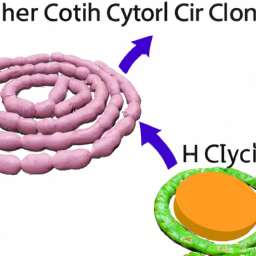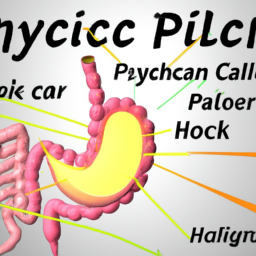The link between H. pylori and stomach cancer

Natural remedies for H. pylori infection
2023-03-05
About Stomach Ulcer, what to do?
2023-03-08The link between H. pylori and stomach cancer

The link between H. pylori and stomach cancer
-
Table of Contents
“Uncovering the Hidden Connection: H. pylori and Stomach Cancer”
Introduction
Helicobacter pylori (H. pylori) is a type of bacteria that can infect the stomach and is associated with an increased risk of developing stomach cancer. It is estimated that H. pylori is responsible for up to 80% of all stomach cancer cases worldwide. While the exact mechanism of how H. pylori causes stomach cancer is not yet fully understood, research has shown that the bacteria can cause chronic inflammation of the stomach lining, which can lead to the development of cancerous cells. Additionally, H. pylori can also cause other digestive problems such as ulcers and gastritis. Treatment for H. pylori infection typically involves antibiotics and other medications.
How Can We Prevent Stomach Cancer Linked to H. Pylori Infection?
Stomach cancer is a serious health concern, and it is linked to an infection caused by the bacteria Helicobacter pylori (H. pylori). Fortunately, there are steps that can be taken to reduce the risk of developing stomach cancer due to H. pylori infection.
The first step is to reduce the risk of infection. H. pylori is spread through contact with saliva, vomit, or fecal matter, so it is important to practice good hygiene. This includes washing hands regularly, avoiding sharing utensils or drinking glasses, and avoiding contact with people who have the infection.
The second step is to get tested for H. pylori. If the infection is detected, it can be treated with antibiotics. This will reduce the risk of developing stomach cancer.
The third step is to make lifestyle changes. Eating a healthy diet that is low in processed foods and high in fruits and vegetables can help reduce the risk of stomach cancer. Additionally, avoiding smoking and excessive alcohol consumption can also reduce the risk.
Finally, it is important to get regular check-ups. Early detection of stomach cancer is key to successful treatment, so it is important to get regular screenings.
By following these steps, it is possible to reduce the risk of developing stomach cancer due to H. pylori infection.<h3 id=”wpaicg-what-is-the-reason-for-the-link-between-h-pylori-and-stomach-cancer”>What is the Reason for the Link between H. Pylori and Stomach Cancer?
Helicobacter pylori (H. pylori) is a type of bacteria that is known to cause chronic inflammation of the stomach lining, known as gastritis. This chronic inflammation can lead to the development of stomach cancer. Studies have shown that H. pylori infection is the most important risk factor for the development of stomach cancer.
The exact mechanism by which H. pylori infection increases the risk of stomach cancer is not fully understood. However, it is believed that the chronic inflammation caused by the bacteria can lead to the formation of precancerous lesions in the stomach lining. These lesions can then progress to cancer if left untreated.
In addition, H. pylori infection has been linked to other factors that can increase the risk of stomach cancer. These include smoking, a diet low in fruits and vegetables, and a family history of stomach cancer.
Overall, H. pylori infection is a major risk factor for the development of stomach cancer. It is important to be aware of the risk factors associated with H. pylori infection and to seek medical attention if any symptoms of gastritis or stomach cancer are present.<h3 id=”wpaicg-exploring-the-link-between-helicobacter-pylori-and-stomach-cancer”>Exploring the Link between Helicobacter Pylori and Stomach Cancer
Stomach cancer, also known as gastric cancer, is a type of cancer that affects the lining of the stomach. It is the fourth most common type of cancer in the world, and it is estimated that over one million people are diagnosed with it each year.
The exact cause of stomach cancer is unknown, but there is evidence to suggest that the bacterium Helicobacter pylori (H. pylori) may be a contributing factor. H. pylori is a type of bacteria that is found in the stomach and is believed to be responsible for the majority of stomach ulcers. It is estimated that up to half of the world’s population is infected with H. pylori, and it is thought that this infection may increase the risk of developing stomach cancer.
Studies have shown that people who are infected with H. pylori are more likely to develop stomach cancer than those who are not infected. This is thought to be due to the fact that H. pylori can cause inflammation in the stomach, which can lead to the development of cancerous cells. Additionally, H. pylori can produce toxins that can damage the cells in the stomach, which can also increase the risk of developing stomach cancer.
The link between H. pylori and stomach cancer is still being studied, but it is clear that there is a connection between the two. It is important to note that not everyone who is infected with H. pylori will develop stomach cancer, and there are other factors that can increase the risk of developing the disease. These include smoking, a diet high in processed meats, and a family history of stomach cancer.
If you are infected with H. pylori, it is important to talk to your doctor about the potential risks and to discuss any lifestyle changes that may help reduce your risk of developing stomach cancer. Additionally, it is important to be aware of the signs and symptoms of stomach cancer, which include abdominal pain, nausea, vomiting, and weight loss. If you experience any of these symptoms, it is important to seek medical attention as soon as possible.
Conclusion
The link between H. pylori and stomach cancer is clear. Studies have shown that H. pylori infection increases the risk of developing stomach cancer, and that the risk is even higher in those with a family history of the disease. While the exact mechanism of how H. pylori increases the risk of stomach cancer is still unclear, it is clear that H. pylori infection is a major risk factor for the development of stomach cancer. Therefore, it is important to be aware of the risks associated with H. pylori infection and to take steps to reduce the risk of developing stomach cancer.
Learn more about the link between H. pylori and stomach cancer by visiting eTestMedical today! Don’t wait, take action now and get the information you need to protect your health.



